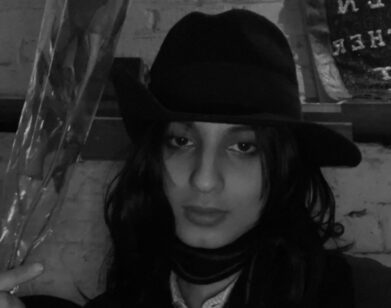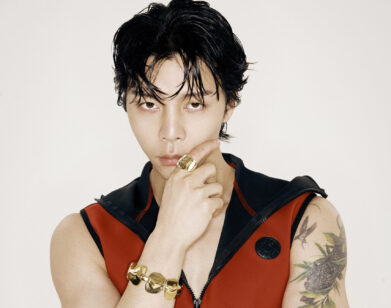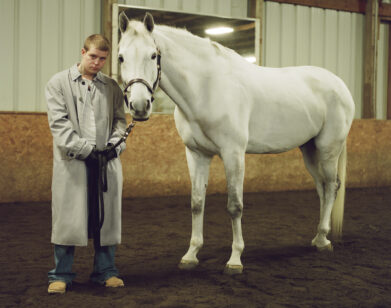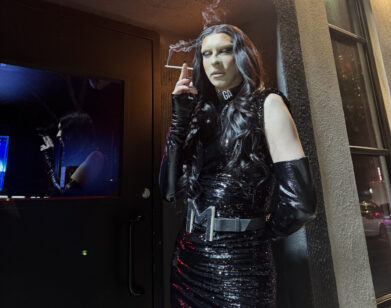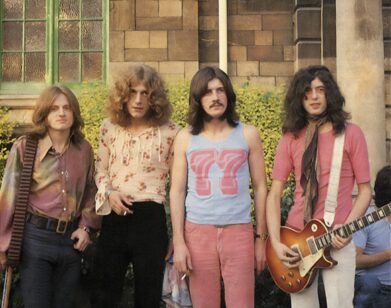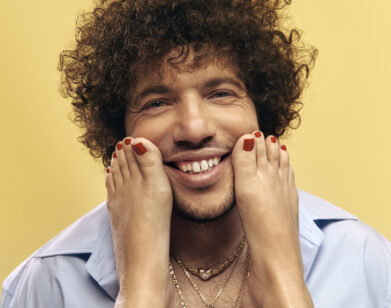King Krule’s Lunar Eclipse
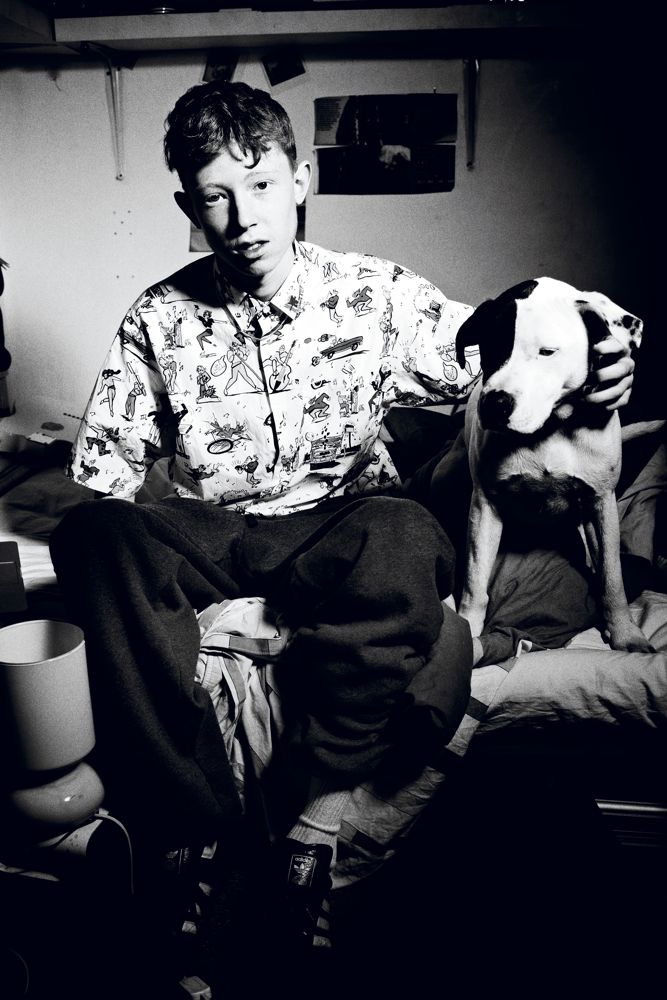
ABOVE: KING KRULE.
On a Friday evening in early August, Archy Marshall is at a train platform in downtown London, en route back to his childhood home in Honor Oak, the inner suburban borough named for a chance 17th-century meeting between Queen Elizabeth I and Welsh politician Sir Richard Bulkeley that took place adjacent to an oak tree.
“I use the train time for thinking,” says Marshall, who records under the alias King Krule, as the doors close behind him. Stepping aboard the Bakerloo Line heading southbound, he’s accompanied by two friends, back in town to help an old schoolmate move out of what was once his bedroom; awaiting him there are his mother’s doting arms and a “little kind of party thing.” Briefly pausing our telephone call—an unexpectedly consistent cellular signal bouncing from Chicago to London and back—he mentions the dinner Mrs. Marshall has prepared, the sound of a smile rising across his face. “BBQ.”
It’s a fitting homecoming meal for Marshall, 18, who first turned heads years ago with a Bandcamp account and a song titled “Out Getting Ribs.” The tune, carried by naught but a gentle wash of reverb and Marshall’s guitar, provided a striking backdrop for his dark English ale of a baritone; it has since won him legions of awestruck devotees, some of whom happen to be members of hip hop’s upper echelon: Tyler, the Creator, Frank Ocean, Earl Sweatshirt, Beyoncé.
If the overwhelming praise is making Marshall nervous, it’s certainly not audible in his voice. Giddily, he recalls the afternoon Mrs. Shawn Carter posted one of his songs on her Facebook page. “That’s wicked!” he shouts in a heightened English tenor, imitating his mother’s reaction. Even as conversation turns to the motivations behind his decision to drop out of school (“I chose music because it seemed like the right thing”), Marshall remains upbeat.
Of major label debut 6 Feet Beneath the Moon (XL Records), Marshall says, “It’s about that theme of not really knowing where to go and not really knowing how to get by from that point onwards.” The record, which releases on his 19th birthday—a Saturday—is all but guaranteed to be the South Londoner’s golden ticket to superstardom; a defiant, uncommercial comment on the lethargy of urban existence as viewed through adolescent eyes.
Exiting the platform and traveling on foot toward his final destination, Marshall is met with the welcoming sights and sounds of home. Even as he strolls past an open-air meat market, the stench offers not discomfort, but nostalgia. “The smell of it,” he says, “from walking down the street, smelling like horrible fresh fish to horrible fresh meat, and hearing dub tracks playing out of shops…”
Marshall pauses, the sound of footsteps slowing. “It’s just a vibe, man,” he says, arriving at a complete stop. Exhaling, he describes his surroundings: “Tropical concrete.”
JOHN TAYLOR: What are you looking at right now?
ARCHY MARSHALL: I’m with two mates at the moment, one called Jeff and one called Jack, and we’re walking and they’ve got nice patterned shirts on, they look nice. And there’s a gray cloud in the sky but it’s blue at the moment, and the sun’s out. Someone just walked past me and lit a cigarette.
TAYLOR: You’re back home. Does it still feel that way?
MARSHALL: When I walk through it, I feel like it’s home. These streets are quite warm to me, quite nice to me because so many different cultures, so many different vibes, and so many different memories from my own head [are] from it. Some days the high street would look like the high street in, I don’t know, in Italy or some shit.
TAYLOR: If we were kids and you invited me to hang out after school, what would your room have looked like then?
MARSHALL: It’s a white room, the walls completely covered with graffiti tags everywhere. Like, ceiling and everything. I used to write on my walls all the time when I was growing up. It was a small cube room, and it had a bed in it, obviously. I had a TV and three amps—small amps—a bass, two guitars, a keyboard, a lot of instruments, and a lot of CDs, more than records. And tapes. And a lot of stuff on the walls, really. Mainly photographs I cut out from wherever, nice images, but a lot of animals, you know? Silverback gorilla, great white shark, interesting animals. I loved animals when I was younger.
TAYLOR: Were in your room more often than not?
MARSHALL: Yeah, man. I’d spend nearly every day there. I used to be a recluse. Chill a lot on my own.
TAYLOR: How’d you pass the time?
MARSHALL: I was always trying to create. I guess I was creating music from quite a young age, but I’m not sure what the earliest is. It all sort of merges together. The sunny days I used to have a balcony and chill on that, play a lot by myself.
TAYLOR: I understand that when writing, some begin with a melody. Where does a song begin for you?
MARSHALL: Usually a chord progression and then maybe a melody over that. When I make music it’s a very visual thing. Conjures up a lot of images.
TAYLOR: What sorts of images?
MARSHALL: Colors, man. A lot of colors and a lot of memories, kind of weird nostalgic memories. A lot of images with depth. Shapes, weird angles mixed with natural linear structures. Curvy lines, straight and narrow, concrete slabs. It’s all quite jumbled and not very normal, it’s quite abstract. Colors build, tones build, form builds, depth builds. It’s all about tone, depth, feel, and form. They all change and develop.
TAYLOR: Is there an image that you associate with “Easy Easy”?
MARSHALL: I see a young person. And I see the mind of a young person and a gray childhood, a “gray childhood” being a wet, gray, grassy park. A lot of snails and a lot of crunches beneath your toes.
TAYLOR: This young child in the park, is he or she lost?
MARSHALL: A lot of the time I was unhappy as a kid so I spent it, I guess, in a gray place. I don’t think the song is angry and I don’t think it is happy, I think it’s really the documentation of a time, and a cluelessness about your own existence; sort of a looking back at your childhood and feeling like you were lost back then, and feeling lost now. Just a weird limbo, not aware of anything. Almost a paradise.
TAYLOR: Paradise, I like that image. You’re still 18, is that right?
MARSHALL: Yeah, 18, yeah.
TAYLOR: It’s a good age. I remember that age.
MARSHALL: It’s a really empowering age. People are still looking down on me, but I feel I can express my views as an adult. I like being the underdog and I like being young because it gives you more to work against, you know?
TAYLOR: As an artist and a young person, what do you see yourself working against?
MARSHALL: A constant sort of, I guess, scrutiny, or constant barrier, or people putting you down as a young person, putting you into a category quite easily. A lot of people who have been perceiving my music have been trying to formulate a genre for it, and I think it’s just a natural thing, it doesn’t need to be categorized. It doesn’t need to be sectioned, if you will. A lot of people are ageist in a lot of things, and I think it’s just a nice way of having another bar to try and climb, another bar to try and better yourself.
TAYLOR: What’s it like to be a youth in London, these days?
MARSHALL: It was good, man. Growing up in any big city, you get exposed to so many beautiful cultures. I’ve grown up with a lot of open eyes around me that’s influenced my eyes to open. I think as well, just, always the issue of feeling lost in this city, feeling really like you’ve got nowhere to go. It’s a constant theme through the music, through the art… people get lost and people can’t find themselves here, you know? I use the city as a metaphor for feeling powerless. I think it’s a thing that I witness day-to-day even with mates that I know.
TAYLOR: Would you say the city still affects you in this way?
MARSHALL: I wouldn’t say I’m in that predicament anymore. My music has done well, so it’s hard for me to comment on that [now]. But because I’m still living with mates who are lost in that place… and two years ago, man, I was in that place and lost out of my brain. It’s just a cycle. There’s lots of vicious cycles to look out for, and I think youth, a lot of them just play it down and get into the nice little lazy life, and sit in their categories and their sections and their labels.
TAYLOR: Was playing CMJ, your first major show in America, a break from that cycle?
MARSHALL: Yeah. I was pretty scared, man. I was playing at three in the morning, delusionally tired. I kind of realized, “Damn, this has taken me this far, something must be going well, something must be sort of popping.”
TAYLOR: [laughs]
MARSHALL: I feel like the first trip to America was really hard for me to get my head around.
TAYLOR: Speaking of which, I’m trying to get my head around the title, 6 Feet Beneath the Moon. What’s that about?
MARSHALL: That’s about being six feet beneath your aspirations. You look up to the moon. It’s your goal, it’s your target, it’s what you look up to. And feeling just submerged, almost in a coffin six feet down by your aspirations. It’s about feeling lost, and constantly trying to look up, but constantly feeling six feet beneath whatever you aspire to do.
TAYLOR: This “moon,” are you rushing towards it? Perhaps you’re floating.
MARSHALL: I am moseying towards the moon.
TAYLOR: What’s the highest you’ve ever been?
MARSHALL: Well, when we go on tour, we like to get on the rooftops of our hotels. I think we got onto the rooftop of the Sheraton in Portugal, it’s a very, very high point. In Athens, we got onto the roof of the joint out there, and that was pretty high. Even in France, our last trip. I just love views, man. I love seeing the city and being in an eagle, bird’s eye sort of spot. And I love getting high.
[both laugh]
TAYLOR: You’re on the rooftop, looking out. What catches your eye?
MARSHALL: I see the distance. I see the depth. Seeing from one side of London to the other side of London, it’s a sort of very, very empowering view. Makes me feel good, man. I feel wisdom running from the ground through my veins. I feel excitement, almost adrenaline.
TAYLOR: Would you describe yourself as an old soul?
MARSHALL: I don’t know what that is. I’d say I’m romantic.
TAYLOR: How so?
MARSHALL: In the sense that I see beauty in everything.
TAYLOR: Close your eyes with me for a moment and think of the future. Tell me what you see.
MARSHALL: I see a really pale pink and a real pale blue, a living room with a beige floor. I’ve got the same shoes that I’m wearing now, a pair of black Clark Wallabees with a suede finish. I see a mirror in front of me and I also see a beautiful, beautiful girl dressed fully in a nice fabric. I’m not sure what the fabric is, but it’s really nice and it’s really soft, almost a beige but not quite a beige. She’s in front of me, floating. There’s a wind, a nice breeze going through the room. I’ve got a guitar in the corner I can see. It’s a nice, white acoustic guitar. And as I look to my right I see out the window, the whole city on fire.
TAYLOR: And are you at peace?
MARSHALL: I see it as a peaceful moment. I’ve got no urges to do anything. Everything’s perfect. I feel accomplished. It feels good. It feels like I’d had a bath. A hot bath.
6 FEET BENEATH THE MOON IS OUT AUGUST 24 ON TRUE PANTHER SOUNDS/XL RECORDINGS. KING KRULE WILL PLAY SEPTEMBER 9 AT BOWERY BALLROOM IN NEW YORK. FOR MORE ON THE ARTIST, PLEASE VISIT HIS WEBSITE.

